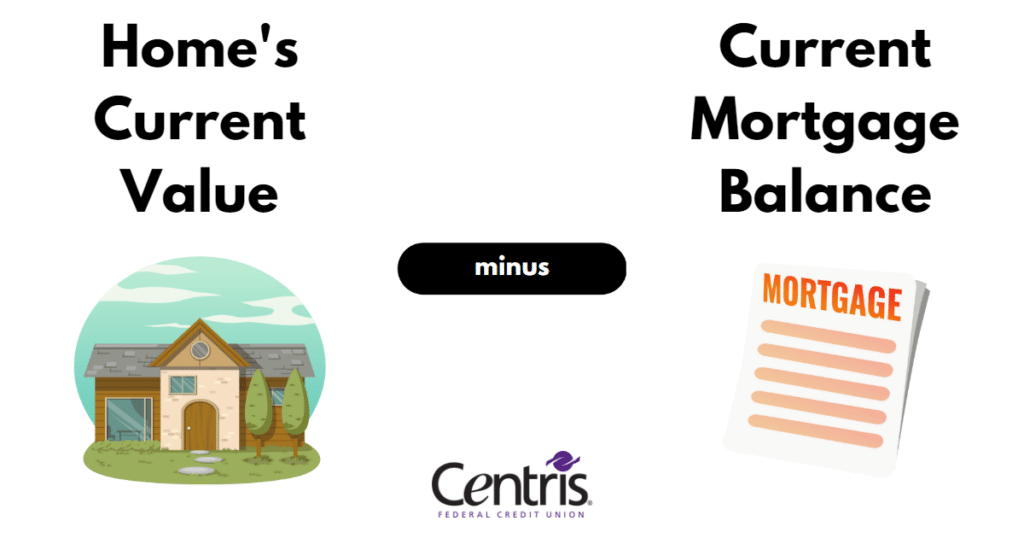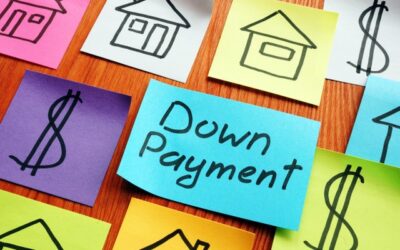There’s a lot of talk about using your home’s equity to your advantage. But what does that mean? Your home is one of your biggest investments and its equity can be a valuable asset! Understanding what your home equity is and how a Home Equity Line of Credit (HELOC) works is important in deciding if this line of credit would be a good choice for your financial journey.
What is Home Equity?
Equity in your home can be defined as the value of a homeowner’s financial interest in their house. Essentially, home equity is the difference between your home’s value and your current mortgage balance
For example, let’s say that homes similar to yours in your neighborhood are valued at $350,000 and your mortgage balance is $150,000. The equity in your home would be:
Home Equity = Home’s Current Value – Current Mortgage Balance
Home Equity = $350,000 – $150,000
Home Equity = $200,000
The amount of home equity you possess can change based on the housing market and making additional mortgage payments.
How Does a Home Equity Line of Credit Work?
A Home Equity Line of Credit (HELOC) is a common product that turns your home’s equity into cash. A HELOC functions a lot like a credit card. Using your home’s equity, you receive a borrowing limit set by the lender. This limit depends on several factors, such as your credit score, the amount of home equity you have and your income.
After receiving a borrowing limit, you then enter the draw period. Draw periods are when you can withdraw funds for use up to your borrowing limit. Draw periods typically last several years. During your draw period, you are generally only required to make interest payments.
Once the draw period ends, you enter the repayment period. Repayment periods last as long as draw periods. During this time, you’re required to make both interest and principal payments.
Just because the funds are available doesn’t mean you have to use them. Generally, it is best to use a HELOC for major expenses rather than day-to-day costs. This can be anything from home renovations, debt consolidation, emergency expenses or paying for a dream vacation.
How to Get a HELOC
The first step in getting a HELOC is contacting a lender who offers them. Home equity lines of credit are offered by most banks and credit unions.
The next step is finding out the market value of your home. As mentioned above, your home’s market value is important in determining how much equity you have. You can get a professional appraisal to assess the value of your home.
Once you contact a lender and know your home’s market value, the lender can then determine your borrowing limit.
Is a HELOC Right for You?
Determining whether or not you should get a HELOC depends on factors like your credit score, level of equity in your home and your debt-to-income ratio. There are pros and cons of home equity lines of credit you may want to consider.
Advantages of Home Equity Lines of Credit
- Draw on funds as you need. HELOCs are nice because you can withdraw money as needed, compared to a regular home equity loan that gives you the lump sum of money upfront.
- HELOCs usually have lower interest rates. When you use your home as collateral, HELOC interest rates tend to be lower than most unsecured loans.
- Pay interest only on what you borrow. As you draw on funds as you need, you only pay interest on what you borrow.
Disadvantages of Home Equity Lines of Credit
- Without a fixed-rate HELOC, you may have variable rates. If home interest rates rise, you could be paying more interest.
- Your home is collateral when you apply for a HELOC. The lender could foreclose on your home if you do not make payments.
- There are fees often associated with HELOCs, like application, underwriting, appraisal, escrow fees, and other closing costs.
- When you get a HELOC, you are taking on more debt, which may affect your debt-to-income ratio.
If you want to learn more about home equity or if you are interested in our HELOC fixed-rate lock option at Centris, visit our website, give us a call at (402) 334-7000 or schedule an appointment. Plus, check out our podcast, A Penny or Two for Your Thoughts, where we talk home equity loans and HELOCs 101.




